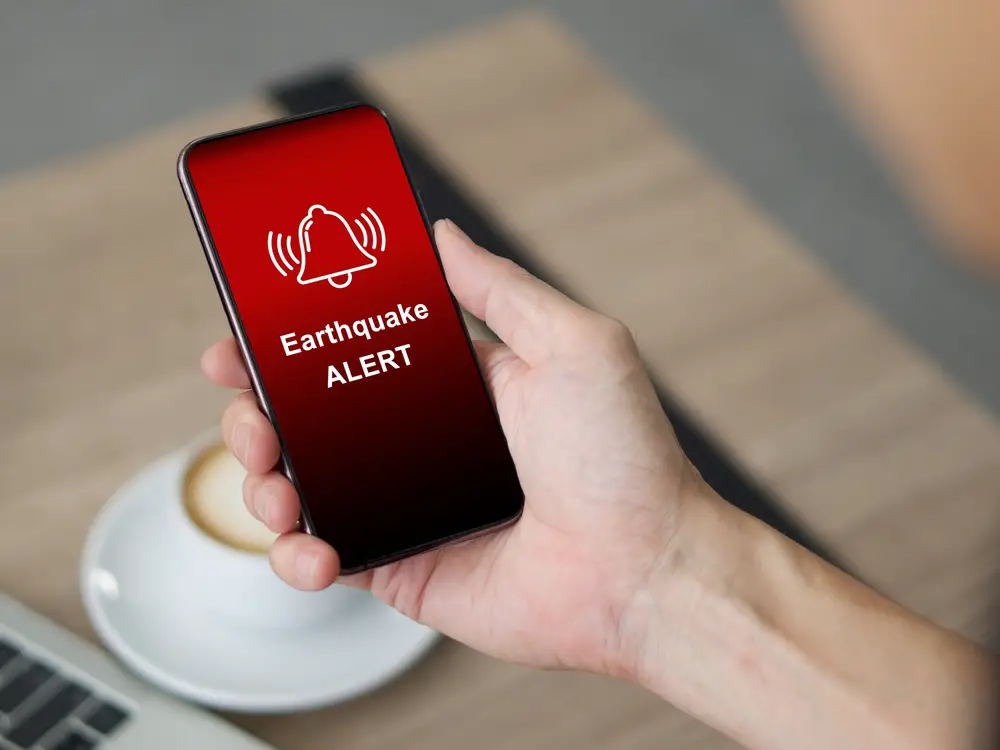Natural disasters have a way of capturing our collective curiosity, especially when it comes to the mysterious signs that might precede them. Earthquakes, in particular, hold a unique fascination because they strike suddenly and often without warning. Despite modern technology, people still look for subtle signs from nature that might predict these seismic events. Here, we explore 14 perplexing phenomena that seem to occur before a major earthquake strikes.
1. Animals Act Strange

Your dog starts whining incessantly, or your cat hides for days, and you are left wondering if they know something you don’t. Anecdotal evidence has long suggested that animals can sense impending earthquakes, behaving erratically in the hours or days before a quake. A study published in BioScience found a correlation between unusual animal behavior and seismic activity, though it stopped short of confirming a causal link. Scientists believe that animals might sense changes in the Earth’s magnetic field or hear frequencies that humans can’t, but this remains a field ripe for more research.
On the ground level, pet owners often report eerie behavior in their four-legged friends right before a tremor. It’s relatable; you might have experienced that moment of chill when your usually calm pet acts out of character. While no one’s suggesting you rely solely on Rover’s instincts for earthquake preparedness, it’s hard to dismiss these widespread observations entirely. It raises the question: do animals have a sixth sense, or are they just more attuned to shifts in their environment?
2. Weather Patterns Get Weird

You’re sipping your morning coffee, feeling the odd weight of the air, and thinking, “Is it just me, or does the sky look different today?” Some people claim to notice peculiar weather changes before an earthquake, like sudden cloud formations or unusual humidity levels. While there’s no scientific consensus linking weather to seismic activity, these observations persist. It’s a reminder that, as much as we understand about the natural world, there’s still an element of mystery that captures our imagination.
The idea that the weather might act as an early warning system is certainly appealing. After all, you already check the forecast daily, why not for earthquakes as well? But whether there’s any truth to it remains elusive; even meteorologists consider it within the realm of folklore. Yet, in those rare moments when the sky does seem strangely ominous, you can’t help but feel a frisson of unease, can you?
3. Electricity Goes Haywire

Imagine your lights flickering for seemingly no reason, prompting you to wonder if your wiring is faulty or if something larger is at play. Some people report electrical disturbances in the days leading up to an earthquake, from appliances malfunctioning to inexplicable power outages. According to a study in the Journal of Geophysical Research, changes in the Earth’s electromagnetic field prior to seismic events may cause these glitches. However, this hypothesis is still debated among scientists, leaving room for both skepticism and wonder.
You might chalk it up to coincidence when your microwave starts acting up or your TV screen flashes unexpectedly. Yet, when you hear of an earthquake shortly after, it can feel eerily connected. While you can’t rely on your electronics as an early warning system, these incidents often serve as a fascinating reminder of how little we truly control. It’s part of the strange allure that keeps us guessing, hoping to catch a glimpse of nature’s secrets.
4. Odd Lights Appear

You’re driving home when you suddenly notice an odd light in the sky, a glow that seems out of place and time. Known as “earthquake lights,” these mysterious illuminations are reported to appear before or during seismic events. The lights vary in color and shape, and while many dismiss them as myths, some geological studies suggest they could be tied to stresses in the Earth’s crust. The exact mechanism remains a puzzle, but it’s one that intrigues both scientists and sky-watchers alike.
When you see something like this, it’s hard not to feel like you’ve stumbled into a science fiction film. The rational part of your brain searches for a logical explanation, while another part wonders if you’re witnessing a secret dance of nature. Earthquake lights add a layer of mysticism to an already mysterious event, making you reconsider what you know about the Earth’s hidden signals. It’s a reminder that there’s always more to discover, even in a world mapped by satellites and sensors.
5. Water Levels Changes

Picture this: a lazy afternoon by the river, when you suddenly notice the water level decreasing rapidly—an unsettling sight. Sudden changes in water levels in wells, rivers, or lakes have been documented prior to earthquakes, sparking debate among scientists. A study in the journal *Nature Geoscience* suggests that stress in the Earth’s crust can alter subterranean water flow, leading to these abrupt shifts. While not a definitive predictor, it’s a fascinating clue in the puzzle of earthquake forecasting.
As you stand by the water’s edge, you might feel a mix of wonder and apprehension. Is this a natural ebb and flow, or something more foreboding? While water level changes are not consistent predictors, they serve as a visual cue that something significant might be happening beneath the surface. It’s these small, often overlooked signs that add to the intrigue and complexity of understanding seismic events.
6. An Eerie Calm Emerges

There’s an unsettling serenity that descends—a quiet calm that some say precedes the tumult of an earthquake. This phenomenon, often described as an eerie stillness, has been reported by people living in seismic regions. It’s one of those experiences that’s difficult to quantify but widely recognized by those who have felt it. Whether it’s a lull in animal noise or an unusual silence in the air, this calm often feels like nature holding its breath.
In those moments, you might find yourself hyper-aware, noticing the absence of everyday background noise. The familiar hum of urban life seems to pause, and a stillness hangs in the atmosphere. It’s a calm that invites introspection, making you wonder if your senses are more attuned to the world than you realize. Though not scientifically proven, this phenomenon is a poignant reminder of the delicate balance between tranquility and chaos.
7. Radon Levels Skyrocket

You might not give radon a second thought, but some researchers suggest you should, especially before an earthquake. Elevated radon levels have been noted before major quakes, as this radioactive gas escapes from the ground. A study published in Earthquake Science highlights how changes in the Earth’s crust could release radon gas into the atmosphere, potentially serving as a seismic precursor. However, the data is inconsistent, and the science remains inconclusive, keeping this theory in the realm of fascinating possibilities.
While you’re not exactly setting up radon monitors in your living room, it’s intriguing to consider how invisible forces like this could signal an impending quake. The idea that something as intangible as gas could be a harbinger of something so monumental is both awe-inspiring and unsettling. It’s another piece of the puzzle in our quest to predict the unpredictable. Even though the jury is still out, these theories continue to intrigue and challenge our understanding of the Earth’s inner workings.
8. Ghostly Sounds Are Heard

You’re lying in bed, half-asleep, when you hear a low rumble that reverberates through the room. Known as “earthquake sounds,” these ghostly noises are reported by some people just before or during seismic activity. The sounds can range from low rumbles to sharp, crackling noises, adding another layer of enigma to the already mysterious event. While these auditory experiences are not well-documented in scientific literature, they are part of the rich tapestry of earthquake folklore.
It’s like the Earth itself is groaning in anticipation, signaling something momentous is about to occur. As you lie there, every creak and groan of your house takes on a new significance. Are these noises just the settling of an old home, or are they something more? While there’s no concrete evidence to support ghostly sounds as precursors to earthquakes, their persistence in anecdotal accounts keeps them alive in the collective imagination.
9. Humans Feel Off

Suddenly, you’re overwhelmed by a sense of unease, a feeling so intense it seems to come out of nowhere. Some people report unusual physical sensations or heightened anxiety before an earthquake, as if their bodies are somehow attuned to the impending event. While there’s little scientific evidence to back this up, the phenomenon is intriguing to psychologists and seismologists alike. It’s a testament to the complex interplay between mind, body, and environment.
You might dismiss it as stress or fatigue, but when coupled with seismic activity, it takes on a different meaning. Perhaps it’s a coincidence, or maybe our bodies are more sensitive to environmental changes than we realize. Either way, these experiences add to the mystique of pre-earthquake phenomena, highlighting our connection to the natural world. They serve as a reminder of how much we still have to learn about the subtleties of human experience.
10. Weird Smells Happen

Walking down the street, you catch an unexpected whiff of sulfur or something metallic, causing you to pause. Reports of strange odors before earthquakes are as varied as they are intriguing, often described as sulfuric, metallic, or even ozone-like. While not scientifically proven, these accounts suggest the Earth might release gases during the stress of tectonic shifts. It’s another layer in the complex narrative of pre-earthquake phenomena, inviting both skepticism and curiosity.
Such smells might trigger memories of high school chemistry labs or camping trips, creating a sensory experience that’s hard to ignore. Whether these odors are linked to seismic activity or are just coincidental, they add a mysterious element to the anticipation of an earthquake. They also serve as a visceral reminder of the Earth’s hidden processes, happening beneath our feet and beyond our immediate perception. It’s these small mysteries that keep us attuned to the world, even as we strive to decode its secrets.
11. Skies Become Fluorescent

Imagine looking up at the night sky, expecting the usual twinkling stars, only to see a fluorescent glow reminiscent of the Northern Lights. Though rare, these luminescent displays have been reported by eyewitnesses before significant earthquakes. Known as “earthquake lights,” they remain one of the most elusive and debated phenomena in seismology. Scientists theorize they could be caused by electrical changes in the Earth’s crust, yet definitive evidence remains out of reach.
As you stand there, captivated by the celestial display, you might feel a blend of wonder and apprehension. The sky, after all, is supposed to be a constant, not a harbinger of geological events. The beauty of these lights contrasts with the potential danger they foretell, creating a sense of awe tinged with uncertainty. Whether they’re a natural oddity or a sign of things to come, these lights continue to fascinate those lucky—or unlucky—enough to witness them.
12. Static Electricity Spikes

You reach for the doorknob and get a sharp zap, wondering if static electricity levels are suddenly off the charts. Some people report heightened static electricity before an earthquake, though scientific validation is scarce. The idea is that stress and shifting in the Earth’s crust could influence the ionosphere, affecting electrical charges on the ground. It’s a theory that, while not universally accepted, offers a tantalizing glimpse into the unseen forces at play before a quake.
In your daily life, static electricity is usually just an annoyance, a quirk of interactions between objects. But in the context of seismic activity, it takes on a new significance, hinting at the complex interplay between Earth’s geology and atmospheric conditions. Whether or not there’s truth to it, the notion adds another layer of intrigue to our understanding of earthquakes. It’s a little jolt that makes you wonder if there’s more happening in the world than meets the eye.
13. Sleep Patterns Go Crazy

You toss and turn all night, plagued by vivid dreams and restless thoughts, and wake feeling disoriented. Some people report disrupted sleep or unusually intense dreams before an earthquake, though the evidence is mostly anecdotal. This phenomenon raises questions about whether our subconscious can pick up on environmental changes that our conscious minds cannot. While scientists are skeptical, these experiences remain a curious footnote in the study of earthquakes.
Sleep, that most personal of experiences, becomes a window into the mysteries of the Earth beneath us. Restlessness might simply be a coincidence, but when shared by those in seismic regions, it becomes part of a larger narrative. These nocturnal disruptions hint at a deeper connection between us and the natural world, one that’s not easily explained by science. They remind us that, even in our most private moments, we’re never entirely disconnected from the planet we call home.
14. Technology Suddenly Malfunctions

Your smartphone freezes, your Wi-Fi drops, and you wonder if Mercury is in retrograde yet again. Before earthquakes, some people experience bizarre tech malfunctions, although scientific support for this is minimal. The idea is that electromagnetic changes could interfere with technology, although this remains speculative at best. It’s one of those modern folklore tales that, while dubious, captures the zeitgeist of our technology-reliant world.
In those moments of tech turmoil, you might question whether the universe is trying to send you a message. While the rational part of your brain knows it’s likely just a coincidence, the timing makes you pause. Could our gadgets pick up on signals that we can’t? Though not a reliable tool for earthquake prediction, these experiences add a layer of contemporary intrigue to age-old seismic mysteries, blending the digital with the geological in a narrative as rich as it is puzzling.
